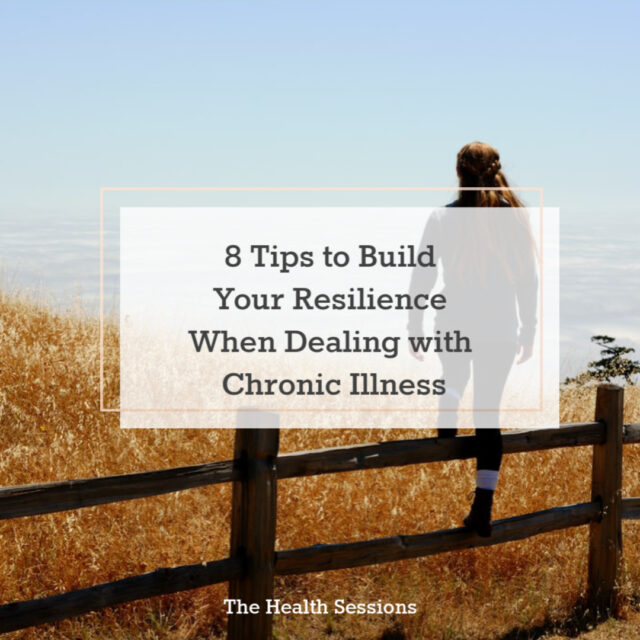36 Inventive Ways to Play with Your Kids When You’re Tired and in Pain

This article is written by Katherine Smith.
If you live with a chronic illness, inner strength is so important to ensuring physical health. Here are 8 ways to empower yourself to both mental and physical wellness.
It’s no overstatement to say that the burden of a chronic illness pays a heavy toll on the body, both physically and mentally, even if the immediate nature of the illness is predominantly physical. While it’s vital to keep your physical health up, maintaining and building your inner resilience throughout your condition is integral in the path to recovery.
Here we look at 8 ways to strengthen your mental fortitude so that you can fight and overcome the chronic illness you might be battling.
A house is only as strong as its foundation. So, as tough as it might initially seem, take the good aspects of your life that you have, and accentuate the positive. Studies have shown that those who can do harness optimism and encouragement for the future experience almost 20% less pain than those who do not.
In a practical sense, note down three good things in your life every morning and before you go to bed, jot down three good things that happened to you that day. Building upon a positive mindset will give you the strongest foundations on which your body can advance the process of recovery.
Now that you’ve laid the foundations of your recovery, it’s time to let negativity go. It is not to say that you need to forget the mindset you once had – there is strength to be found in recognizing that you had the mental fortitude to grow from a position of despair into a place of positivity.
At the same time, much like saying goodbye to a toxic relationship, leave it behind knowing that you’re tough enough to move on. Conduct a self-assessment identifying the parts of your character that represent you. You will come to realize soon enough that it’s not despair that defines you, but your strength of character and how you move forward.

Foundations built, despair behind you, it’s time to move forward. It may be cliched to say but it’s true: if you’re not moving forward, you’re going backward. The path to recovery represents physical growth, from cell-impairment to cell-restoration.
The same is true of our mental self and internal goals. Set in place a plan and an objective to strive. Put together a plan for the month, the year, and five-years ahead, visualizing where you want to be and what you want to have achieved in that time.
Once you have your intentions in mind, lace-up your metaphorical boots, and take those first steps out the door. Be confident in the journey you are about to take.
There’s no question, life is tough for everyone, and the best side of humanity is in the spirit of putting the needs of others before your own. However, sometimes you have to prioritize yourself, and recuperating from a chronic illness is one of those times.
Much like trying to save another swimmer when you’re drowning yourself, this is the life-circumstance when you have to focus on your recovery. Prioritize your needs, and learn to say no, politely but firmly – this is the season of your restoration. Also set time out of the day for you, find a quiet place and meditate, keeping yourself mentally fresh and reinvigorated for whatever challenges face you ahead.
Don’t get sidetracked, or you’ll find yourself eventually in a position to help others far better than when you could during your period of recovery when it comes again in the future.

Self-reflection can be both difficult and frightening. Difficult in terms of trying to identify what you’re feeling in the first place and frightening in terms of what you eventually come to find once the curtain of emotion has been pulled back.
However, identifying our feelings allows us to be more connected with both ourselves and others, improving individual mental wellness and helping develop attachments with our inner-circle .
The best way to identify your feelings is firstly by understanding that there is more than just feeling stressed or anxious. Over time you will gain comprehension of the nuanced feelings you are undergoing and connect them with their proximate cause. From here, you will be able to identify the situations that trigger feelings, be more prepared for your emotional response, and feel a higher sense of control over the circumstances.
Mental wellness is not just a consequence of realigning internal mindset, but also from the external sources you put in your body, like food. Eating well can help improve your brain health, just as much as eating wrong can negatively impact it.
Look to avoid processed foods with high levels of sugar that can create mood swings and energy deficiencies, then try to introduce foods that encourage mental stability. The best brain foods are rich in omega-3 and include oily fish such as salmon, tuna, and mackerel. These foods improve cognitive function and are fundamental for brain structure.

Finally, engage with life so that you can move beyond what you’re going through, to enjoy and live life to the fullest. Getting out to travel as your condition allows, or keeping fit and making gains from the benefits of exercise, as well as enjoying quality time with your family and friends will give you the motivation to continue on the journey to recovery.
Emotional support from your friends and family will do much to give you external sources of inner strength when you need it. Studies have shown that a strong support network encourages inner-resilience and helps the individual manage stress during a difficult time. Your support network can include family, friends, work colleagues, and fellow chronic-illness sufferers who might be able to relate to your situation better than others.
Conclusion
The path to recovery with a chronic illness is not easy, but we cannot understate the benefits of remaining resilient and building up that inner mettle to the healing process. Whether it’s through food, meditation, top-rated memory pills, or your mindfulness, stay strong inside, you’ll soon find yourself getting better on the outside too.
If you enjoyed reading this article, you might also like: